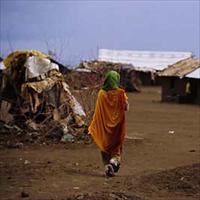ANGOLA-DRC: Activists denounce political apathy towards migrant rape victims

Human rights activists in the Democratic Republic of Congo (DRC) have accused their government and that of Angola of turning a blind eye to reports of widespread rape and other abuses of DRC migrant workers in neighbouring Angola.
“The situation seems to be getting worse but the Angolan and Congolese authorities we have repeatedly approached show no political will to end the situation,” said Floribert Chebeya, who heads Voice of the Voiceless, a DRC NGO.
Amigo Gonde, president of the Human Rights Defence Association, was equally critical of the DRC government. "Rape is used here in Congo as in other countries as a psychological weapon to defeat the enemy and humiliate ... Similarly, by these acts, Angola wants to reinforce the idea that Congolese people are and should remain inferior.
"The DRC government has an obligation to protect its citizens both on its own soil and abroad but instead our leaders display weakness when it comes to talking to other countries, especially Angola, where it plays the beggar," he added, noting the abuses had been going on since 2004.
The issue gained widespread media attention on 5 December when Médecins Sans Frontières (MSF), an international humanitarian organisation, released a statement denouncing what it described as “the pervasive and systematic use of rape and violence perpetrated by the Angolan army during the expulsions of Congolese migrants working in diamond mines in the Angolan province of Lunda Norte”.
“Women are systematically raped by several soldiers, some of them raped in front of their children. This abhorrent practice continues and is repeated over several days as they are transported to the border,” MSF director of operations Meinie Nicolai stated.
The head of the Belgian branch of MSF in DRC, Josep Prior, told IRIN that the aim of the “rape and violence against Congolese [was to] make them leave” Angola.
The MSF statement included testimonies from 100 women who claimed to have been violated several times during their expulsion from Angola.
"They are often gang-raped by Angolan soldiers, one after another, often repeatedly and sometimes in front of other expellees," said Fabienne de Laval, MSF-Belgium's field coordinator in Kasai Occidental province, one of the border areas where tens of thousands of those expelled from Angola have been arriving.
"In Kamako village, we have organised a place to take care of women who come with major difficulties, such as sexually transmitted diseases, including HIV/AIDS, and other complications," said De Laval.
Some women said they had been forced to leave their Angolan husbands behind after being threatened by soldiers.
"What we denounce is not the expulsions per se, but the systematic practice of putting people in police cells, sometimes for a whole week, raping them every day, leaving them without food or water, and sometimes transporting them in lorries where they are again subjected to violence," said Prior.
Many people die en route and their corpses are thrown into the bush, asserted the MSF report. According to testimonies quoted by Prior, men, women and children had died of starvation.
Figures compiled by the UN show that 44,000 Congolese have been expelled from diamond mining areas of Angola since January 2007. An estimated 400,000 DRC citizens still live in those Angolan areas despite the problems. Activists have accused the Angolan military of committing the same abuses on DRC territory.
Asked about the MSF report, Angola's ambassador to DRC, Mawete Joao Baptista, would not comment.
DRC human rights activists held marches in July to denounce the evictions and violations and handed protest memoranda to both the Angolan embassy and the DRC authorities.
Angolan authorities began to expel illegal immigrants from the country in December 2003, targeting illegal workers in its diamond mines near the border with the DRC.
 Back and Next - Back and Next
Back and Next - Back and Next See Also - See Also
See Also - See Also